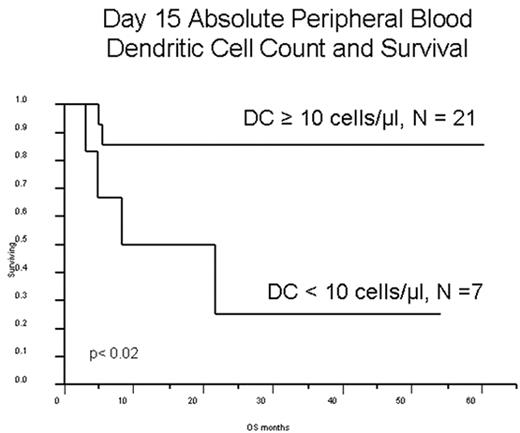Abstract
The peripheral blood absolute lymphocyte count (ALC) on day 15 after autologous stem cell transplantation (ASCT) has been shown to be an independent predictor for overall survival (OS) for many malignancies including acute myelogenous leukemia (AML), breast cancer, multiple myeloma (MM), primary systemic amyloidosis, and Hodgkin’s and non-Hodgkin’s lymphoma (NHL). A recent report (
Dean et al. BMT 2005; 36, 1049–1052
) suggested that infused autograft dendritic cells (DC) affect survival post-ASCT in NHL. Thus, DC recovery at day 15 post-ASCT was assessed and correlated with OS. Preliminary data from an ongoing prospective study of 28 NHL patients post-ASCT are reported. Absolute DC at day 15 was analyzed by four color flow cytometry using antibodies to CD3, CD14, CD16, and CD19. In this approach lymphocytes and DCs were initially gated by their similar forward and side light scatter characteristics; DCs were then identified as cells in this gate that lacked staining for the lymphocyte antigens CD3, CD16, and CD19 and the monocyte antigen CD14. The percentage of antigen negative cells cells in the lymphocyte gate was then multiplied by the coincident peripheral blood absolute lymphocyte to determine the absolute DC count. Survival was then analyzed using the Kaplan-Meier method. With a median follow-up of 18 months, patients recovering a DC of 10 cells/μl or above experienced superior median OS versus those who did not (not reached vs 21 months, p < 0.02, Figure 1). This study shows that an immunocompetent immune system at day 15 (not only ALC recovery, but also DC recovery) correlates with survival in NHL patients undergoing ASCT.This study was supported in part by the Grant CA90628-04A from the National Institute of Health, and the University of Iowa/Mayo Clinic Lymphoma Spore CA97274.
Author notes
Disclosure: No relevant conflicts of interest to declare.
2007, The American Society of Hematology
2007


